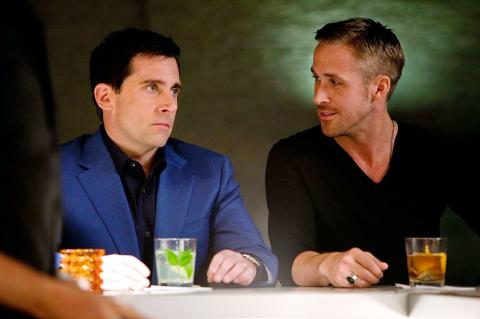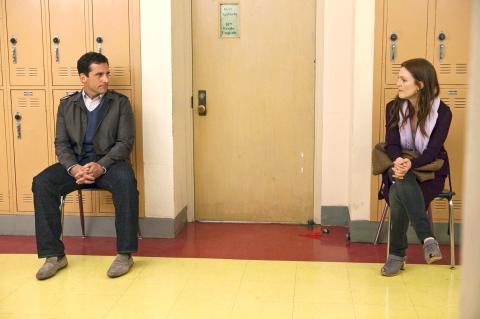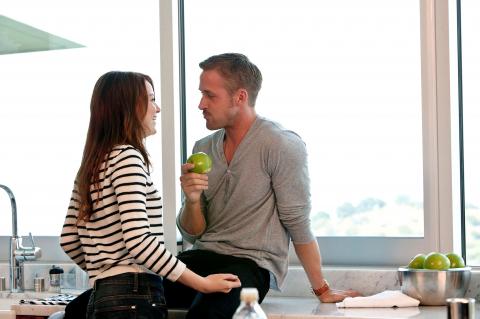Crazy, Stupid, Love is, on balance, remarkably sane and reasonably smart. Directed by Glenn Ficarra and John Requa, this movie, packed with appealing stars, is a smooth blend of modern comic genres with a surprising undercurrent of dark, difficult emotion. Essentially a study in the varieties of masculine sexual confusion, it travels the circuit from bromance to a kind of Y-chromosome weepie that might be called male-odrama, with a detour into the briar patch of adolescent awkwardness.
Steve Carell, who on the big screen often impersonates sweet, anxious guys dutifully holding their inner Michael Scott firmly in check, plays Cal Weaver, an everyman with a family, a nice suburban house and an office job. He also has a bad haircut and terrible fashion sense, as he will be told by Jacob (Ryan Gosling), a pickup artist who volunteers his services as coach in the game of seduction.
Cal accepts the offer because his wife of more than two decades, Emily (Julianne Moore), has told him that she wants a divorce, and that she has cheated on him with a co-worker (Kevin Bacon) only slightly less nebbishy than Cal himself. Nursing his self-pity at a sleek local bar, Cal meets Jacob, who tries to do for him something like what Will Smith did for Kevin James in Hitch. (The movie analogy Jacob proposes is Mr Miyagi in The Karate Kid.) In a determined, half-pathetic attempt to even the score with Emily, Cal sets out to score with as many women as he can.

Photo courtesy of Warner Bros
Complications, as the saying goes, ensue, but they are not necessarily the ones you might expect. The script (by Dan Fogelman, whose other credits include Bolt and Cars) follows what seem to be tangential threads of plot. These are eventually spun together in a chaotic climax that manages to be astonishing without destroying the film’s hard-won credibility. (The superfluous tying up of loose ends that occupies the final 20 minutes or so does some damage, I’m afraid.) Crazy, Stupid, Love takes its time, understanding that digression can be more important, and more satisfying, than relentless forward momentum. The movie also prefers small improbabilities and minor-key incongruities to big, loud, naughty jokes.
And so we spend some time with Cal and Emily’s son, Robbie (Jonah Bobo), who has a crush on his baby sitter, Jessica (Analeigh Tipton), who has a crush on Cal. We also make the acquaintance of Hannah, a recent law school graduate with the bad luck to have a useless boyfriend (Josh Groban) and the splendid good fortune of being played by Emma Stone. An early encounter drops the hint that Hannah and Jacob will wind up together, but we don’t know quite how, or how that connection will intersect with Jacob’s mentor-protege friendship with Cal.
On the way to finding out, we are treated to two supervised visits with Marisa Tomei; a man-on-man shopping-mall makeover-montage; a sweetly funny almost-hookup; and bumpy scenes from Cal and Emily’s marriage, which staggers and wheezes but will not quite die. With understated sympathy to match its sense of human ridiculousness, Crazy, Stupid, Love, when dealing with this weary, worried couple, navigates a zone of adult ambivalence and disappointment that most comedies are too timid to explore.

Photo courtesy of Warner Bros
Ficarra and Requa showed an ability to mix pathos, whimsy and eccentricity in I Love You Phillip Morris, their debut feature. Here they balance respect for the romantic imperative that is part of the movie’s Hollywood DNA — there is lots of soapy, sincere talk of soul mates and endless love — with a sober acknowledgment of the limits of romanticism.
In part because of this attempt to balance skeptical wisdom with dreamy reassurance, the movie itself is far from perfect. Its missteps include an icky and uncharacteristically insensitive resolution of the Cal-Jessica-Robbie triangle and too little screen time for Moore and Stone. They are not badly treated — not shamed, slobbered over or idealized, as women often are in man-centric comedies — but you may wish that their own predicaments had as much weight as those of their former and potential mates.
But comedies don’t really work that way anymore. The old screwball idea of heterosexual courtship as a battle of equally matched, contending forces is close to extinct. Same-sex friendship — male in The Hangover and a hundred others like it; female pretty much only in Bridesmaids and the Sex and the City pictures — now provides both the machinery of humor and the scaffolding of sentiment that prevents the jokes from becoming too mean.

Photo courtesy of Warner Bros
Gosling and Carell (whose production company is responsible for Crazy, Stupid, Love) make a pretty good couple. Both are nimble enough to sidestep egregious caricature, but neither is above a bit of obvious mugging when it serves the cause. So Jacob, a smooth, self-satisfied master of the game — you have the feeling that he has indeed memorized The Game and watched every episode of Mad Men and Entourage at least twice — is also a bit of a fool. (It takes Hannah to perceive this and to see it as his best trait.) The logic of Cal’s character works in reverse: His wardrobe and manner are the butt of easy, foolproof jokes, but in time we discover that underneath his clumsiness lies an anxious commitment to his own battered dignity.
It is possible to wish that Crazy, Stupid, Love were sharper and also to admire its decency and its unshowy skill. “I know the PG-13 version of this night,” Hannah says during her second encounter with Jacob, insisting that what she wants is R all the way. The movie opts for mildness, modesty and chastened optimism. At the same time, though, it seems to know that a crueler, more cynical rendering of its story — a “Bitter, Hopeless, Love” — lurks between the lines. What makes it worth watching, and worth liking, is the sense that it arrives at its warm and comforting view of things not by default but by choice.

The canonical shot of an East Asian city is a night skyline studded with towering apartment and office buildings, bright with neon and plastic signage, a landscape of energy and modernity. Another classic image is the same city seen from above, in which identical apartment towers march across the city, spilling out over nearby geography, like stylized soldiers colonizing new territory in a board game. Densely populated dynamic conurbations of money, technological innovation and convenience, it is hard to see the cities of East Asia as what they truly are: necropolises. Why is this? The East Asian development model, with

June 16 to June 22 The following flyer appeared on the streets of Hsinchu on June 12, 1895: “Taipei has already fallen to the Japanese barbarians, who have brought great misery to our land and people. We heard that the Japanese occupiers will tax our gardens, our houses, our bodies, and even our chickens, dogs, cows and pigs. They wear their hair wild, carve their teeth, tattoo their foreheads, wear strange clothes and speak a strange language. How can we be ruled by such people?” Posted by civilian militia leader Wu Tang-hsing (吳湯興), it was a call to arms to retake

This is a deeply unsettling period in Taiwan. Uncertainties are everywhere while everyone waits for a small army of other shoes to drop on nearly every front. During challenging times, interesting political changes can happen, yet all three major political parties are beset with scandals, strife and self-inflicted wounds. As the ruling party, the Democratic Progressive Party (DPP) is held accountable for not only the challenges to the party, but also the nation. Taiwan is geopolitically and economically under threat. Domestically, the administration is under siege by the opposition-controlled legislature and growing discontent with what opponents characterize as arrogant, autocratic

When Lisa, 20, laces into her ultra-high heels for her shift at a strip club in Ukraine’s Kharkiv, she knows that aside from dancing, she will have to comfort traumatized soldiers. Since Russia’s 2022 invasion, exhausted troops are the main clientele of the Flash Dancers club in the center of the northeastern city, just 20 kilometers from Russian forces. For some customers, it provides an “escape” from the war, said Valerya Zavatska — a 25-year-old law graduate who runs the club with her mother, an ex-dancer. But many are not there just for the show. They “want to talk about what hurts,” she